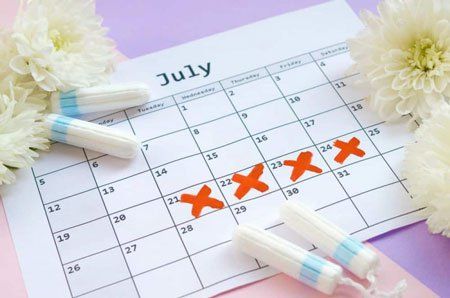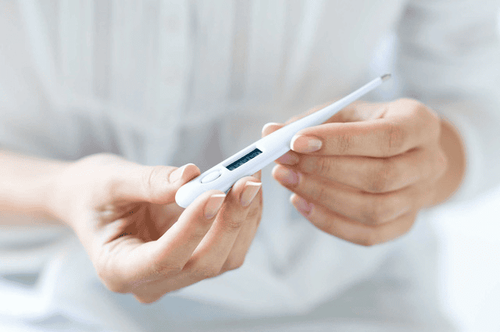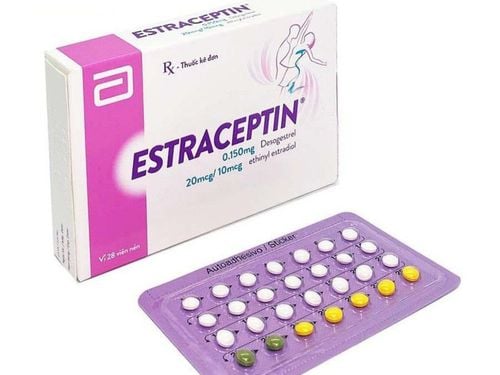This is an automatically translated article.
There are many factors that can change a person's menstrual cycle and make their periods shorter and lighter. Body weight, exercise, and stress can all cause this condition.
1. How is the menstrual cycle too short?
Understanding what is normal in a period will help you determine if your period is indeed short. Menstruation comes when the lining of the uterus sheds, passes through the cervix and vagina to come out, this usually happens every month.
Your period is usually consistent in number of days and volume of bleeding. A woman's menstrual cycle is usually 21 to 35 days. The number of days (bleeding) can range from two to seven days. However, your period can change over time and for different reasons. For example, if you are pregnant, you will not get your period because the lining does not shed, but grows to nourish the fetus.
Every woman's menstrual cycle is different, and your period may come at the right time or earlier or later than usual.
Menstrual cycle bleeding less than usual is not usually cause for concern. People often find their menstrual flow varies from month to month, and some months will naturally be less than others.
In some cases, light bleeding may indicate pregnancy or a hormone-related condition. Similarly, people may think they are menstruating when in reality they are having a discharge that is mixed with blood.

Chu kỳ kinh nguyệt của mỗi người là khác nhau
2. Symptoms of a short menstrual cycle and light bleeding
During a typical menstrual period, a woman loses an average of 50 - 80ml of blood. However, there are great differences between individuals. People should take note if their period is less than usual. A person can measure how much menstrual blood they lose each month using a menstrual cup.
Low bleeding menstrual cycle can have some of the following symptoms:
Menstrual duration is shorter than usual (compared to the person's own normal menstrual cycle). Need to change tampons less than usual. There is not as much flow as usual for the first 1-2 days but there is a light, steady flow. Bleeding looks like spotting for a few days instead of a steady flow. Sometimes, having a light period can also relieve premenstrual syndrome (PMS) symptoms, such as lower back pain, uterine contractions, or mood swings.
Remember that you can experience an irregular period for no particular reason, but you should still let your doctor know. They can help identify any underlying causes that may be affecting your menstrual cycle and vaginal bleeding.
3. Causes of short menstrual cycle and low bleeding
The following factors can cause periods to be less than usual:
Age: menstrual cycles can change throughout a woman's life. The initial menstrual cycle is usually shorter and may indicate less bleeding. They become more frequent when a girl is between the ages of 20 and 30. In your late 30s and 40s, menstrual cycles may become more frequent and shorter in duration. They can go months without a period, and get their period later. After that, menstruation usually becomes less frequent and more irregular during perimenopause.
Not ovulating: sometimes a woman has irregular periods because her body doesn't release an egg, which is called ovulation. This can lead to less or irregular periods. Underweight: People who are underweight may notice that their periods are very light or stop altogether. This change occurs because their body fat levels drop so low that they don't ovulate regularly.

Thiếu cân sẽ khiến cho lượng trứng rụng ít hơn bình thường
Exercising too much: Women who exercise regularly can alter their menstrual cycle. Athletes can be stressed, have a low body weight, and use up a lot of the body's energy. This can lead to changes in the length of your period, such as a shortened menstrual cycle or temporary amenorrhea. Pregnancy: During pregnancy, a woman's periods will usually stop completely. However, people may mistake implantation bleeding for a short period of time. Bleeding during implantation is an early sign of pregnancy, and usually lasts for 2 days or less. When a woman is having normal sex and has not had a period, she may want to take a pregnancy test.
Breastfeeding: If you are breastfeeding, your period may not return immediately after giving birth. Milk-producing hormones prevent ovulation and cause your period to slow down. You may get your period a few months after giving birth if you're breastfeeding. However, you can still get pregnant while you're breastfeeding, even if your period hasn't returned. That's because you'll ovulate two weeks before your first postpartum period. If you've had unprotected sex while breastfeeding and have bleeding, you should take a pregnancy test to confirm that the bleeding is not due to implantation.
Stress: periods of stress can affect the body's hormonal balance, which in turn can disrupt a regular menstrual cycle. You may experience short menstrual cycles or temporary loss of periods. Once the stress is released, your period should return to normal. Birth control: When people start taking oral contraceptives, they may notice shorter periods and less bleeding. This reduction in blood flow may be due to the low dose of hormones in the Pill and the failure to stimulate the uterus to form a thick lining. As a result, a woman may have light menstrual periods because there is very little uterine lining to shed. This can also happen in people who use hormonal IUDs, implants, or injections, because they thin the lining of the uterus. People may experience some initial spotting between periods as the hormones begin to help regulate their periods.
In certain cases, a doctor may recommend that someone with a short period take birth control to help regulate their cycle. Certain types of birth control contain hormones that can help a woman's periods become more regular.
You may also experience irregular periods if you have recently started or stopped using birth control.
Eating disorders: Anorexia nervosa and bulimia are types of eating disorders that can cause irregular periods. Eating disorders can lead to low body weight, which can alter the hormones that regulate your periods. Polycystic ovary syndrome (PCOS): if you have irregular periods or have stopped menstruating, it could be the result of polycystic ovary syndrome. This causes hormonal changes in the body that cause the eggs to stop maturing This hormonal change can also do:
Change your weight and lead to obesity Grow more acne Causes facial hair to grow More Leads to infertility

Thay đổi nội tiết tố có thể khiến mụn mọc nhiều hơn
Your doctor can diagnose polycystic ovary syndrome through the use of ultrasound. That's because this syndrome causes cysts to form in your ovaries. If you have polycystic ovary syndrome, your doctor will likely recommend that you lose weight and take birth control pills to help get your periods back to normal.
Your doctor may also prescribe metformin (Glumetza, Riomet, Glucophage). This medication is usually prescribed for people with type 2 diabetes, but it is sometimes used to treat people with polycystic ovary syndrome. It helps control insulin levels and may help improve ovulation, which can regulate your menstrual cycle.
Serious medical condition: Irregular or irregular periods can be a sign of a more serious medical condition. Regular menstruation shows that your body is working well. Light menstrual periods can be a sign of a hormone problem or another medical condition. Polycystic ovary syndrome and problems with the reproductive organs can lead to irregular periods. Discussing your symptoms with your doctor can help you determine the cause of your lighter-than-normal periods.
4. When do you need to see a doctor during your period?
Light menstrual bleeding is not usually a cause for concern. However, if you regularly have light periods or are starting to stop menstruating altogether, you should talk to your doctor.
You should also see your doctor if your period coincides with other symptoms of concern, such as pelvic pain.

Nếu kinh nguyệt thất thường kéo theo nhiều triệu chứng nguy hại khác bạn cần đến gặp bác sĩ
Your period may come out less than usual for no apparent reason. Contact your doctor if you experience the following:
Missing three periods in a row and not getting pregnant You think you may be pregnant Have irregular periods Bleeding between periods Feeling menstrual pain Also, contact your doctor if you notice any other symptoms related to your menstrual cycle.
A light period may not be a sign that you have something to worry about. Even a short bleeding period of two to three days is considered normal. If you miss your period or have spotting and think you might be pregnant, take a pregnancy test. Make sure to track your short menstrual cycle and talk to your doctor.
Gynecological examination is a very important step to help women know their health status as well as their fertility, so that they can have a timely treatment plan if they happen to have it. Where to go for gynecological examination is a question that many women care about. Currently, Vinmec International General Hospital has deployed service packages for examination and screening of basic gynecological diseases.
When registering for the basic gynecological examination and screening package, customers will receive:
Specialized gynecological examination Transvaginal ultrasound of the uterus and ovaries Transvaginal ultrasound of the breasts Tests such as: Treponema pallidum rapid test, Chlamydia rapid test, taking samples for cervical-vaginal cytology, bacterioscopic staining (female vaginal fluid), HPV genotype PCR automated system, Total urinalysis by automatic machine . Any questions that need to be answered by a specialist doctor as well as customers wishing to be examined and treated at Vinmec International General Hospital, please register for an online examination on the Website for the best service.
Please dial HOTLINE for more information or register for an appointment HERE. Download MyVinmec app to make appointments faster and to manage your bookings easily.
Reference sources: healthline.com, medicalnewstoday.com












